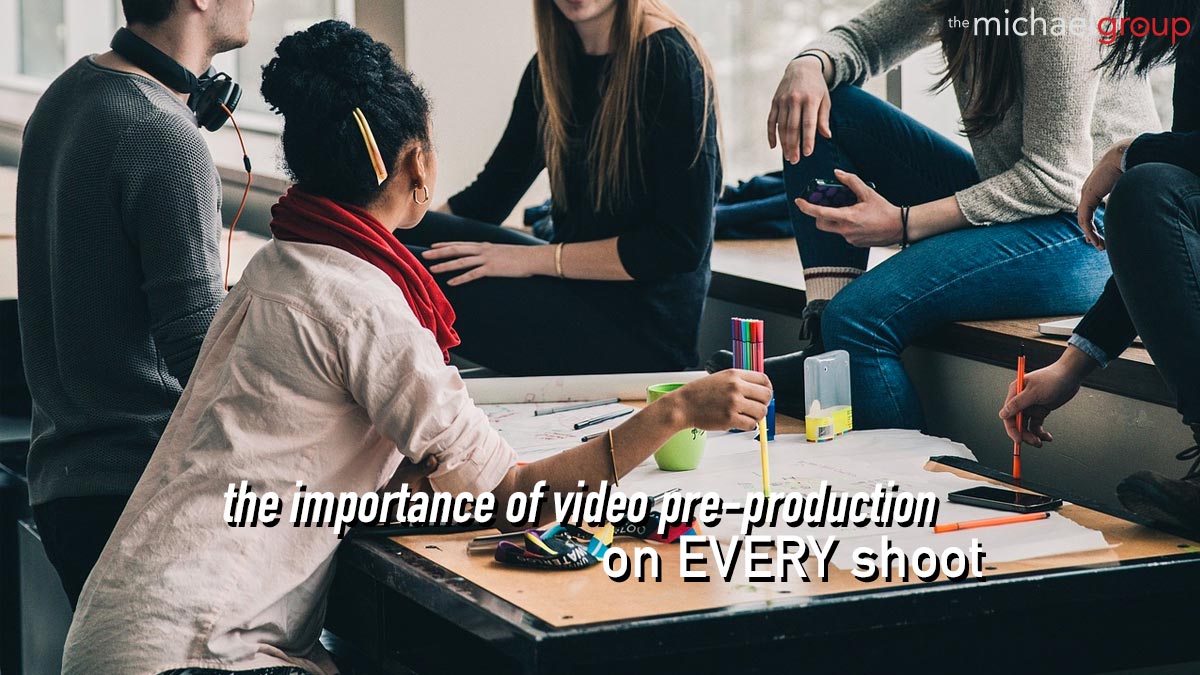
Many people think that because they have a small video they want to film they can skip the process of pre-production. This is not true. No matter how small or big your production is, video pre-production is crucial. Failure to do careful and structured planning could have a domino effect on the entire shooting process, costing you time, money, and perhaps even your company’s image. To help you plan for success we have compiled a list of reasons why you should place importance on pre-production, and find out what can’t be corrected in post-production.
The most important step to make before you even decide to touch a camera is to work out exactly what your vision for the video is. No matter the size of the job the production team will need a plan, a larger picture, and a sense of what exactly it is that you want people to get out of your video. Whether it is a straightforward teaching video or an interview, or something as involved as a commercial or motion picture, there needs to be a main objective. If you lack this initial vision, it is worth your time to find it, because it acts as your guide through the whole filming process.
Once you have a vision for what you want your video to be, it is time to brainstorm. For larger projects, our professional team can advise you on all aspects you may not even have considered such as permits and leases. For smaller jobs our team will brainstorm with you to get the most out of the experience and create something that looks well-thought out and polished, down to the very fine details. In fact, small jobs don’t mean less work, it takes careful planning to make something look effortless.
Think hard about what you want people to be seeing and hearing in the video, and how this may affect the way you film it. For example, if you wanted to film an advert showing off a new cleaning product, you may imagine that you would need an actor testing it in a home.
The production team will let you know if your ideas are possible, they will research how, where, who, and what, which will allow you to move onto the next stage of planning – the visuals.
We cannot stress how valuable storyboarding your video process is. In this stage the production team figures out the exact angles and compositions they want, and in what order the story will play out. Storyboarding gives you that initial visual representation and mind map of how the video will play out. The storyboard will serve as your blue print later, and having a structured and detailed blueprint will allow the filming to run smoothly ahead. The effect of planning ahead is to save you a lot of readjusting and experimenting on set when everyone is standing around waiting for you to make a decision.
If part of your vision includes a model looking out from the glass booth in Sears Tower, you may be disappointed when you don’t have space for your camera and are plagued by noisy tourists. For this reason, it is important to scout your locations to see if they fit your idea, and if they have the space to accommodate a crew and equipment. Some locations require permission or booking, which needs to be sorted out so that you can also coincide it with actor or interview bookings.
Heading over to your location and doing a few test runs may also be a good idea. A location recon will give your team an idea of noise levels and ease of access, as well as assessing if the location really does fit your vision. If for instance a train comes whooshing past every half hour, or you know that children play football nearby at certain times of the afternoon, you can better figure out what time of day suits your schedule.
Figuring out a timeline is extremely important to do before filming so that you can make the most of your time and any talent you may have booked for specific days. Try to organize filming locations that are near each other on the same day so that you don’t lose time travelling. For smaller jobs make sure that if you need to book a room out that you have done so, and plan where and when you will film. Prepare the area beforehand, else you risk turning a small job into a lengthy one. Create call sheets and distribute them to the crew so that everyone has a detailed itinerary of where to be and when, because this will ensure that all of your equipment and locations are ready to go and can be used exactly when needed.
Creating a budget beforehand is a key step in video pre-production. There are many costs such as permits, locations, equipment renting – even making sure there is food available for your crew during shooting. Barring any unforeseen mishaps, sticking to your timeline strictly will ensure that you stay within budget and that the shooting process goes smoothly.
A lot of money can be wasted when you have failed to create a detailed plan. Making sure you have everything ready from the idea and storyboards, to permissions, location access and talent, will stand you in excellent stead for a quality production. Always turn to your production team for help and plan ahead for success.